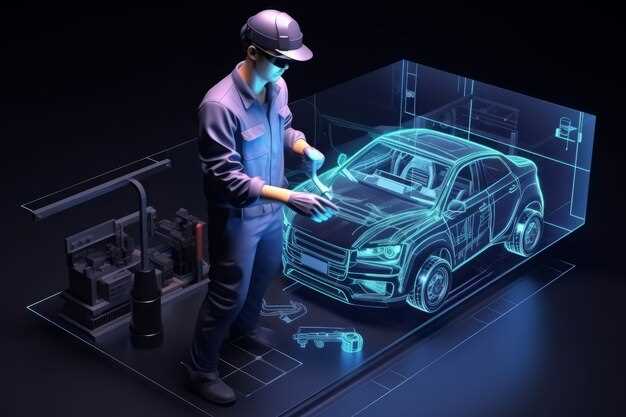
In the rapidly evolving world of manufacturing, the automotive industry stands at the forefront of technological advancement. As car manufacturers strive to enhance efficiency and transparency within their supply chains, blockchain technology emerges as a revolutionary solution. By leveraging decentralized networks, automotive logistics can achieve unprecedented levels of traceability and security, effectively addressing long-standing challenges in the sector.
The integration of blockchain into automotive logistics facilitates streamlined operations by enabling real-time tracking of components and vehicles. This innovation not only reduces the risk of fraud and miscommunication but also fosters collaboration among various stakeholders, from suppliers to manufacturers to distributors. As companies explore the potential of blockchain, the entire ecosystem experiences enhanced reliability and accountability, paving the way for a more resilient supply chain.
As we delve deeper into the implications of blockchain on automotive logistics, it becomes evident that this technology is not merely a trend but a pivotal shift in how cars are produced and delivered. The seamless flow of information enabled by blockchain ensures that every part of the manufacturing process is documented and verified, ultimately leading to improved quality control and a superior end product for consumers.
Enhancing Supply Chain Transparency with Blockchain

The integration of blockchain technology in automotive logistics significantly enhances supply chain transparency. This decentralized ledger provides an immutable record of every transaction, allowing stakeholders to trace the journey of a car and its components from production to delivery. Each transaction related to parts procurement, manufacturing, or transportation is securely logged, thereby reducing the potential for fraud and errors.
By utilizing blockchain, manufacturers and suppliers gain real-time visibility into the supply chain processes. This visibility enables them to promptly identify delays, disruptions, or quality issues that may arise during the production or distribution of cars. Enhanced transparency facilitates better communication among all parties involved, ensuring that everyone operates with the same information and promoting accountability.
Moreover, blockchain fosters trust in the supply chain. Consumers can verify the authenticity and origin of car components, ensuring they meet safety and quality standards. For instance, when purchasing a vehicle, customers can access its entire history, including recalls and maintenance records, secured by blockchain technology. This verification process not only increases consumer confidence but also strengthens brand reputation.
In conclusion, the application of blockchain in automotive logistics is revolutionizing supply chain transparency. By providing a secure, real-time view of operations, it enhances efficiency, reduces risks, and builds trust among participants. As the automotive industry evolves, adopting blockchain will be crucial for companies aiming to stay competitive and maintain high standards of integrity in their supply chains.
Streamlining Vehicle History Tracking in Manufacturing

Blockchain technology has emerged as a transformative force in automotive logistics, particularly in enhancing the tracking of vehicle history during the manufacturing process. Traditional methods of tracking a car’s provenance are often cumbersome and prone to errors. By leveraging blockchain, manufacturers can create an immutable record of each car’s journey from assembly to delivery.
One of the key advantages of using blockchain in vehicle history tracking is its decentralization. Every stakeholder in the supply chain, from component suppliers to manufacturers and dealerships, can access a shared ledger that simultaneously updates real-time data concerning a car’s production milestones. This transparency not only reduces misinformation but also builds trust among parties involved.
Furthermore, blockchain facilitates a detailed and accurate log of a vehicle’s lifecycle events. Each time a significant event occurs–whether it be an assembly stage completion, a quality check, or a shipment–this information is securely recorded on the blockchain. The result is a comprehensive history that allows manufacturers and consumers to trace a car’s origins effortlessly.
Moreover, the integration of smart contracts within blockchain platforms automates processes related to vehicle history tracking. For instance, smart contracts can automatically trigger notifications when diagnostic tests are performed or when warranty information needs to be reviewed, ensuring that all pertinent data remains up to date.
Overall, implementing blockchain technology for vehicle history tracking not only streamlines operations but also enhances accountability and traceability within the manufacturing sector. As the automotive industry continues to evolve, the adoption of such innovations will become essential for maintaining competitiveness and ensuring product integrity.
Integrating Smart Contracts for Real-Time Inventory Management
The integration of smart contracts in automotive logistics offers a significant advancement in real-time inventory management, particularly within manufacturing processes. Smart contracts, self-executing contracts with the terms directly written into code, enhance transparency and efficiency across the supply chain.
In the automotive industry, real-time inventory management is crucial to meet demand and minimize costs. By utilizing blockchain technology, manufacturers can leverage smart contracts to automate inventory tracking for car parts and components. This automation eliminates the need for intermediaries, reducing delays and potential errors associated with traditional inventory systems.
Smart contracts can be programmed to trigger actions based on specific conditions, such as stock levels reaching a predefined threshold. When inventory levels fall below this threshold, the smart contract can automatically initiate a reorder process, ensuring that manufacturers maintain optimal levels of essential car components without manual intervention.
Additionally, the integration of IoT devices enhances the functionality of smart contracts by providing real-time data on inventory status. Sensors can monitor stock quantities and alert both suppliers and manufacturers instantly, enabling proactive management of the supply chain. This connectivity not only reduces the risk of stockouts but also minimizes excess inventory, leading to cost savings and increased efficiency.
Moreover, the transparency offered by blockchain allows all parties involved to track the movement and status of vehicle components seamlessly. This visibility fosters trust among suppliers and manufacturers, as all transactions and changes are recorded on an immutable ledger. As a result, any discrepancies can be identified and addressed swiftly, significantly improving collaboration within the automotive supply chain.
In conclusion, integrating smart contracts into automotive logistics transforms real-time inventory management by enhancing accuracy, reducing costs, and promoting efficiency. The shift to automated systems supported by blockchain technology positions manufacturers to respond quickly to market demands, ultimately leading to improved operational performance in the competitive automotive sector.



